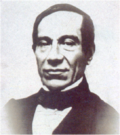| |||||||||||||||||||||
| |||||||||||||||||||||
| |||||||||||||||||||||
 |
|---|
Presidential elections were held in Peru in May 1872. Manuel Pardo of the Civilista Party was elected with 69% of the vote, becoming the first civilian to be elected to the presidency and the first opposition candidate to win a presidential election in Peru. [1]
They have been described as the first free and fair elections in Peruvian history. [2]



